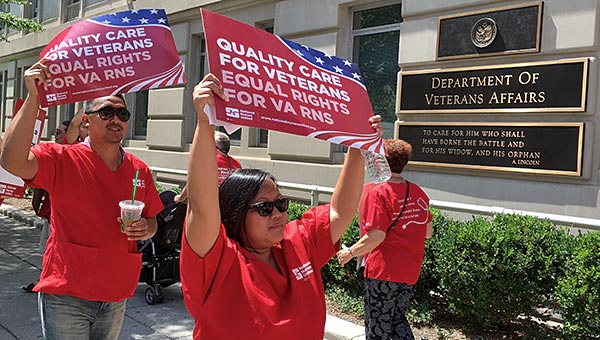Press Release
RNs Criticize Proposed New VA Rules Charging they Pave the Way to Eroding Care for Veterans

National Nurses United (NNU), which represents 11,000 registered nurses who work at the Veterans Affairs hospitals, today criticized the latest steps by this administration to push privatization of the Veterans Affairs health system through proposed rules unveiled by VA Secretary Robert Wilkie for implementing the VA Mission Act.
“Under the guise of simply implementing the law passed by Congress last year, the intent of the rules is to accelerate a privatization campaign that would significantly degrade the quality of care for our nation’s veterans,” warned NNU Copresident Jean Ross, RN.
The new rules establish the conditions under which the VA would pay with public funds for veterans to be eligible for primary care, specialty care and mental health services in the private sector.
In part, the rules specify certain wait times for which eligibility for privatized care would be permitted – despite the fact that studies have shown that VA wait times are actually shorter than in the private sector. JAMA just published a new study which found mean wait times at the VA are 17.7 days compared to 29.8 in the private sector.
“As nurses who care for some of the sickest and poorest veterans, we understand the complexities of their illnesses and are not only culturally competent to care for their unique needs, but are able to address their health and wellness through a number of non-medical interventions, such as housing and employment,” Irma Westmoreland, RN and NNU board member. “Furthermore, the VA offers unparalleled expertise in service and combat-related illnesses such as PTSD, loss of limbs, traumatic brain injury, blindness and hearing loss.”
According to the New York Times, VA officials say the percentage of veterans eligible for care in the private sector under the new rules would rise to between 20 and 30 percent, compared to 8 percent currently.
“We are witnessing a deliberate attempt to drain the coffers that feed the VA and to force our veterans into the fragmented and chaotic private sector, a system that is costly, inefficient and unprepared to meet the needs of our veterans,” said Ross. “Nurses are concerned that veterans returning from combat will find it harder to find specialized care or advocates to help them navigate through the maze of private-sector providers. If we fail to provide for our veterans, we are failing to live up the promise we made when they took the oath to serve.”
Numerous studies have shown that the VA offers care that is equal to or superior to care in the private sector. The latest such study came out of Dartmouth late last year. Researchers found that in 121 regions, the VA performed “significantly better” than other hospitals in 14 out of 15 measures.
In addition, as a number of analyses indicate, including a 2014 Congressional Budget Office (CBO) analysis, the VA is able to provide care at a substantially lower cost than if the same care had been purchased at Medicare rates. Further analysis of CBO data and data from Centers for Medicare (CMS) show that from 2000 through 2017, VA spending per person increased by 43.4 percent, while the spending by private health insurance increased by 76.6 percent.
It should be noted, the VA is the only fully transparent, fully integrated health care system in the country. No private-sector hospital system in the country is subject to more oversight or reporting than the VA.
“The VA is a model to be emulated, not destroyed,” said Ross. “We owe it to our veterans to offer them care that is high quality medical care tailored to their unique needs. That is what veterans deserve, that is what they paid for with their service, and that is what the VA provides.”
Through its affiliated National Nurses Organizing Committee, NNU represents 11,000 nurses at 23 VA facilities across the country.